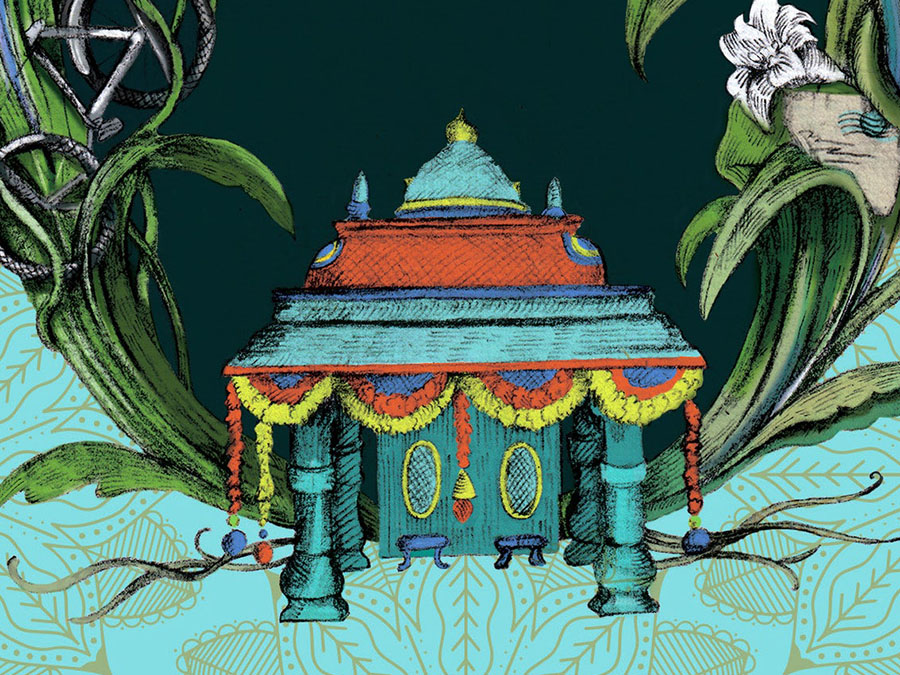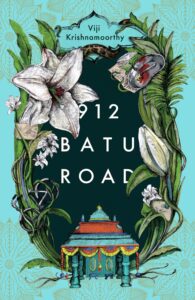A Malaysian debut novelist combines a contemporary love story with a historical narrative of Japanese occupation. I enjoyed one much more than the other, but would recommend it nonetheless.
I picked up a copy of 912 Batu Road at a bookshop in Penang on my recent trip to Malaysia. I was attracted by the beautiful cover (see below) and the enticing blurb about the deft weaving of a modern-day forbidden love story with a historical narrative about the Japanese invasion of Malaya in World War II.
My expectations were high, not just because of the cover and blurb but also because the only other Malaysian novel I’ve read, Evening is the Whole Day, was so good that I not only reviewed it but also interviewed the author, Preeta Samarasan. Although I didn’t end up loving 912 Batu Road as much as Evening is the Whole Day, it did mostly live up to my expectations.
First, the good part: the historical sections set in World War II are meticulously researched and convincingly narrated.
Beautiful Historical Thread Evoking Complex Moral Choices
Krishnamoorthy explores the effects of the conflict through the stories of two families, the Iyers and the Tans, and their Japanese friend Bob Nakamura. They all suffer in different ways, and they all have to grapple with incredibly difficult moral choices such as balancing loyalty to nation vs. family vs. friends, how much to risk in such dangerous times, how to balance resistance to occupation with protection of loved ones, and so on.
The different ethnic origins of the main characters allow the author to make interesting observations on Malaysia’s complex multicultural society and how it responds to the strain of such an all-encompassing conflict. Some of it may also be inspired by her personal history as the daughter of a Tamil father and Hokkien Chinese mother born in Ipoh. In fact, 912 Batu Road, the address in the title and the house in which much of the action takes place, is where her father was born.
The novel introduces us to several real wartime resistance figures while telling the complex story of the two families and their Japanese friend. It’s a compelling narrative that brings up interesting questions about the way people respond in extreme circumstances, and it shows us several different sides of human nature.
Less Successful Modern-Day Thread
Although I liked the concept of a modern-day forbidden love story to explore the echoes of those long-ago choices in the present day, I found those sections less successful than the historical ones. The lovers in question are Geeta and Ken, grandchildren of the Iyer and Tan families from the World War II narrative. Although Ken’s father is happy for them, Geeta’s parents are set on a traditional arranged marriage to a fellow member of the Brahmin community, and they lay a massive guilt trip on Geeta in an attempt to force the two lovers apart.
It has all the ingredients of an interesting story, but in the end it all feels quite predictable. The trouble with forbidden love stories is that few contemporary writers have the courage to do what Shakespeare did with his star-crossed lovers and kill them off. It’s much more common, at least in the books I’ve read, for them to follow much the same trajectory: happy as secret lovers in the first third of the book, miserable in the middle sections as they are apparently defeated by stifling social conventions, and then ultimately triumphant as they overcome said conventions and follow their hearts.
I don’t consider what I just wrote to be a spoiler, simply because it is obvious from the very early stages of 912 Batu Road that things must go this way. We live in an era in which traditions like arranged marriage and subservience to the wishes of parents and society are widely seen as old-fashioned and unwanted restrictions on individual freedom. So it’s impossible to conceive of a version of this novel in which Geeta and Ken shrug their shoulders and agree to stay apart and be miserable just to please their parents. Maybe those novels do exist, but I haven’t read any, and this certainly isn’t one of them.
The story, then, is less a case of “Will they or won’t they?” and more a case of “When will they?” The intrigue comes from finding out how they will overcome their challenges and get together, and that part I found quite disappointing. Krishnamoorthy sets up a potentially interesting narrative involving Geeta’s uncle, who did submit to family pressure and give up his love in his youth, but although he gives Geeta support, he doesn’t play a decisive role in the resolution. The letters Geeta is reading throughout the book from her grandfather, similarly, turn out to be an interesting thread that doesn’t really lead anywhere much.
In fact, the resolution happens very quickly, right at the end, with all the seemingly insurmountable obstacles suddenly kicked over thanks to a timely intervention from the grandson of Bob Nakamura. It’s a good way to bring the historical story and the contemporary one together, but it didn’t feel very convincing or satisfying to me.
To Sum Up…
Overall, I’d recommend 912 Batu Road for the fascinating historical narrative with its well-researched and convincing details of life in Malaysia under the Japanese occupation, but not so much for the modern-day narrative that runs alongside it.





There are 2 comments
It sounds suspiciously as though the author was advised to add a modern storyline to appeal to contemporary readers who prioritise that, then the wordcount swelled astronomically, shifting the advice to “now wrap it up”! heheh It really IS a pretty cover though: I can see how it drew you to read the description and take it with you.
Ha, that sounds exactly right! It’s a shame because the historical narrative could easily have stood on its own. But I can definitely see the editing process playing out like that!